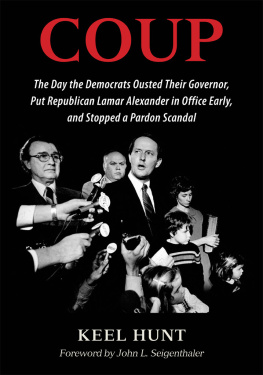COUP
COUP
The Day the Democrats Ousted Their Governor, Put Republican Lamar Alexander in Office Early, and Stopped a Pardon Scandal
byKeel Hunt
Vanderbilt University Press
Nashville
2013 by Vanderbilt University Press
Nashville, Tennessee 37235
All rights reserved
First printing 2013
This book is printed on acid-free paper.
Manufactured in the United States of America
Photo credits: All photos courtesy of Senator Lamar Alexander; Sandy Campbell; Hal Hardin; Mike McWherter and Ned McWherter, Weakley County Library, Dresden, Tennessee; the Nashville Public Library, Nashville Room, Special CollectionsNashville Banner Archives; Tennessee Technological University Eagle yearbook, 1956; the Tennessean Photo Library and John L. Seigenthaler, Chairman Emeritus; and David Wilder.
Library of Congress Cataloging-in-Publication Data on file
LC control number 2012038290
LC classification F440.H86 2013
Dewey class number 976.8'05dc23
ISBN 978-0-8265-1932-0 (cloth)
ISBN 978-0-8265-1934-4 (ebook)
What is most important of this grand experiment, the United States? Not the election of the first president, but the election of its second president. The peaceful transition of power is what will separate this country from every other country in the world.
George Washington
For Marsha,
who gave me Shannon and Zach,
who gave us Olivia and Henry
CONTENTS
by John L. Seigenthaler
FOREWORD
The date: May 19, 1790. The New England sky, from Maine south to New Jerseys border, gradually darkened and by noon was like midnightblanketed with a menacing ceiling of swirling, low-hanging, black clouds. The sun, through the thick overcast, appeared blood red. Rivers ran silted with a flakey, pitch-like sediment.
People in the streets panicked. Many, fearful that the end of the world was at hand, left their work to rush home to loved ones. Others fell to their knees in prayer. In the Connecticut legislature, there was near bedlam. Members cried out for immediate adjournment. In the midst of it, Colonel Abraham Davenport stood, demanding silence.
I am against adjournment, he shouted, and the tumult died. The day of judgment, he declared is either approachingor it is not.
If it is, he said, I choose to be found here, doing my duty. He called for lighted candles, and the business of the government went forward.
AS I READ AND REREAD the manuscript of Coup, by Keel Hunt, I was reminded, more than once, of the anecdote about Colonel Davenport, often recited by John F. Kennedy during his 1960 presidential campaign. The point of the future presidents story was that in times of crisis, leaders must stand with vision and courage against the clamor of the crowd.
It was 189 years and a thousand miles from that day in Hartford to a dark day in Tennessee history when leaders in the state legislature faced a different sort of crisis, but one requiring the same vision and courage exemplified by Colonel Davenport so long before.
The date: January 17, 1979, a morning when the weather was markedly unlike that frantic day the New Englanders world went black. (For a time it was believed that an eclipse of the sun was responsible for that dark day in Connecticut. More recently scientists have argued that a massive forest fire in Canada was the cause of the furor.) The sun, this morning in Nashville, peeked briefly from an overcast sky, then vanished as chilled rain began to fall. All the while, the Cumberland River ran its choppy, brindle flow, uncolored by the dusting of snow that fell about nightfall.
Tennesseans hoped the weather would warm by Saturday, when Lamar Alexander, a Republican, was scheduled to be sworn in as the states forty-fifth governor, succeeding Ray Blanton, a Democrat.
Then, suddenly, at mid-morning on that damp, brisk Wednesday, a cloud of political corruption, invisible but palpable, enveloped the state capitol, threatening to spoil Alexanders carefully arranged inaugural plans.
For state officials at the highest level, it was a single, hellish dark day that must have seemed endless until, finally, it climaxed with what Keel Hunt calls the coup. Honey Alexander, within hours of being Tennessees first lady, remembers it as the worst day of my life.
The individual stories of those government officials involved in the coupeach account unique, but all of them intersectingwere scattered like disconnected pieces of a jigsaw puzzle on the table of history until the author conceived this book. Perhaps because it happened so quickly, and without major disagreement, protest, or dissent, this truly historic moment has been buried in the public mind. In unearthing the drama in gripping detail, Keel Hunt assures that the dark day will be remembered as a bright one in which conflicted politicians came together in the public interest.
For weeks before that day, there had been a flow of news reports and political rumors about dishonesty at the core of the incumbent Blanton administration. Journalists had been referring to it as the pay-for-pardons scandal, in which cash changed hands to win executive clemency for convicts, some of them murderers and rapists.
In December, there had been the shocking spectacle of the governors legal counsel and two other close Blanton aides caught in an FBI sting linked to the corruption. There had been video-taped evidence that marked money had been paid to Blantons legal counsel in return for the release of a notorious criminal. Federal agents arrested the governors lawyer in his office in the capitol building, after finding some of the marked bills in his pocket.
Then on Monday night, January 15, five days before the scheduled end of his term, Blanton publicly acknowledged that he had, indeed, signed pardons and clemency documents that would free fifty-two inmates, some of them sentenced to long terms for violent crimes.
The governor denied that he had taken cash for clemency and claimed he had acted because a court had found prison conditions overcrowded. (After his term ended, Blanton eventually went to prison but not for selling prison pardons. He was convicted for accepting money from a businessman for whom he had approved liquor store licenses.) Although the public had no hint of it, the FBI had evidence that thirteen more convicted criminals were to be released immediately. Nor was it known that additional documents had been prepared for Blantons signature for the release of at least twenty-eight more convicts before Saturday.
A sense of frustration and disgust gripped the leadership of the Tennessee legislature. Ned McWherter, the house speaker, felt it. So did John Wilder, the lieutenant governor, who presided over the Senate. As public angst grew with each daily news report of the venality, McWherter and Wilder felt paralyzed and powerless. They were close to Blanton, their fellow West Tennessean and fellow Democrat, but distressed by his conduct.
The state constitution was plain. The governor had the sole power to pardon. The constitution stated clearly that the only way to remove a governor for malfeasance was by impeachmenta tedious process that could take weeks, perhaps months. Bill Leech, the state attorney general, also a Democrat, whose job it was to officially advise the legislature on legal matters, felt the same sense of disillusionment and impotency.
Some six blocks away from the capitol, Hal Hardin, the US attorney, had every reason to share the sentiments of Leech, Wilder, and McWherter. Almost four years earlier, Hardin had been the first state judge Governor Blanton had appointed to the bench. Now, having left his judicial post, he was the chief federal law enforcement officer in Middle Tennessee, appointed by the president of the United States. He had direct access to the FBIs intelligence.
Next page







